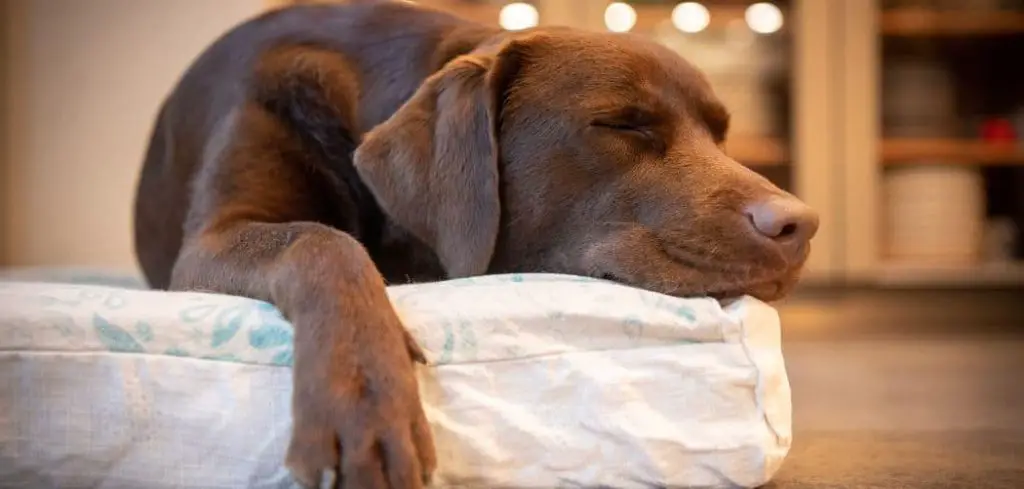Hearing an old dog making a strange breathing noise can be unsettling. Whether it sounds like wheezing, snorting, honking, or rattling, unusual breathing sounds often leave dog owners wondering if something serious is going on.
We outline the common causes of weird breathing noises in old dogs, what you can do at home, and when to seek veterinary help.
Old Dog Making Weird Breathing Noise — Why It Happens
Unusual breathing sounds in senior dogs can stem from a variety of conditions, ranging from harmless quirks to signs of serious illness. Some causes include age-related airway changes, respiratory infections, collapsing trachea, heart disease, or even nasal obstructions.
While some noises may simply be due to a harmless snore or reverse sneeze, others can point to conditions that require veterinary attention.

Old Dog Making Weird Breathing Noise: Common Causes
Collapsing Trachea
The trachea, or windpipe, can weaken as dogs age, especially in small breeds like Pomeranians, Yorkies, and Chihuahuas.
When the tracheal rings lose their firmness, the airway can partially collapse during breathing. This often causes a honking, goose-like cough or noisy breathing.
Owners may notice their dog making the sound more during excitement, pulling on the leash, or after exercise. While mild cases can be managed, severe collapse can restrict airflow and require medical treatment.
Read more: Old Dog Making Grunting Noises (Here’s why)
Respiratory Infections
Senior dogs are more vulnerable to respiratory infections, such as kennel cough, pneumonia, or bronchitis.
These conditions can cause wheezing, rattling, or crackling noises in the lungs as fluid and inflammation interfere with normal breathing. Other signs may include coughing, nasal discharge, fever, or lethargy.
Respiratory infections in older dogs should not be ignored, as their immune systems may be weaker and complications can develop quickly.
Heart Disease
Heart conditions such as congestive heart failure are unfortunately common in older dogs.
When the heart struggles to pump efficiently, fluid can back up into the lungs, leading to abnormal breathing sounds like crackling, wheezing, or labored breaths. Dogs with heart disease may also cough at night, tire easily, or have a swollen belly.
Weird breathing noises linked to heart problems are a red flag that requires veterinary assessment as soon as possible.
Laryngeal Paralysis
In some aging dogs, especially large breeds like Labradors, the muscles that control the larynx (voice box) weaken and stop functioning properly.
This causes the airway to remain partially open, leading to noisy, raspy breathing. The sound often worsens with activity, heat, or stress.
Laryngeal paralysis can become life-threatening if the airway becomes obstructed. Surgery is sometimes needed to improve airflow in severe cases.
Nasal Blockages or Growths
Polyps, tumors, or even something as simple as a lodged blade of grass can obstruct airflow through an old dog’s nasal passages.
This often leads to snorting, snuffling, or one-sided noisy breathing. If the obstruction is chronic, you may also notice sneezing, nasal discharge, or a reduced sense of smell.
In older dogs, persistent nasal noises should always be checked, as tumors are more likely with age.
Reverse Sneezing
Although less serious than the other causes, reverse sneezing can be alarming if you’ve never witnessed it before.
It causes sudden snorting or honking noises, often mistaken for choking. The episode usually resolves on its own within seconds, but frequent episodes in an old dog may indicate irritation from allergies, nasal mites, or airway inflammation.
While usually harmless, frequent or severe reverse sneezing in a senior dog warrants a vet check.
What to Do If Your Old Dog Is Making Weird Breathing Noises
If your old dog is making unusual breathing noises, start by observing the context. Notice whether it happens during rest, activity, eating, or at night. This can give important clues about the underlying cause.
At home, keep your dog calm and avoid situations that worsen the sounds, such as pulling on a collar. Switching to a harness can relieve airway pressure in dogs with tracheal issues.
Monitor for additional symptoms like coughing, lethargy, or reduced appetite. These signs can help determine whether the noise is a mild issue or part of a larger health problem.
Keep your dog in a cool, stress-free environment, especially if the breathing noise worsens with heat or excitement. For dogs prone to airway issues, maintaining a healthy weight can also help reduce strain on the respiratory system.
While you can take measures to keep your dog comfortable, unusual breathing sounds in a senior dog should almost always be discussed with your veterinarian.
When to Call or Visit Your Vet
Seek veterinary care immediately if your dog’s breathing noise is accompanied by distress, open-mouth breathing, or bluish gums. These are signs of oxygen deprivation and can be life-threatening.
Also call your vet if the noise is persistent, worsening, or paired with coughing, lethargy, or fainting. Senior dogs are more fragile, and even minor symptoms can escalate quickly.
If your dog collapses, struggles to breathe, or appears panicked, treat it as an emergency and go to the nearest veterinary hospital right away.
Read more: Old Dog Coughing and Gagging (Should you be concerned?)
Key Takeaway
Strange breathing noises in an old dog can range from harmless quirks to serious health concerns. While some cases, like reverse sneezing, are not dangerous, others such as collapsing trachea, infections, or heart disease need veterinary care.
Pay close attention to when the noises occur, monitor for other symptoms, and never ignore signs of distress.
With prompt veterinary guidance, many causes of noisy breathing in senior dogs can be managed to keep your companion comfortable and safe.
